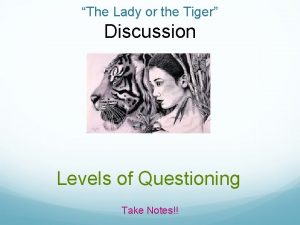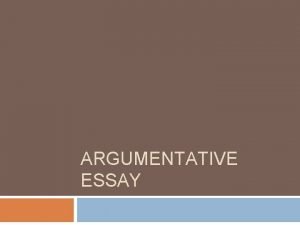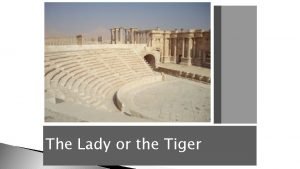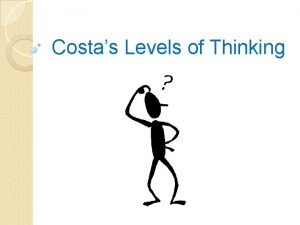The Lady or the Tiger Discussion Levels of













- Slides: 13

“The Lady or the Tiger” Discussion Levels of Questioning Take Notes!!

Questions Progress in Depth from simple comprehension to complex analysis. 1. Remembering: Retrieve or recall definitions or facts. 2. Understanding: Interpret, classify, compare, infer, explain. 3. Applying: Use learned information in a new context. 4. Analyzing: Determine how parts relate to each other to create a whole. 5. Evaluating: Make judgment based on criteria. 6. Creating: Reorganize, plan, or produce something new using learned information.

Questions Progress in Depth from simple comprehension to complex analysis. (Remembering) Retrieve or recall definitions or facts: Remembering Understanding Applying Analyzing Evaluating Creating 1. How is justice represented in the story? (Understanding) Interpret, classify, compare, infer, explain: 2. Is this real justice? (Evaluating) Evaluate or make judgment based on criteria: 3. Why or why not?

What type of question is this? When asked about the ending of "The Lady, or the Tiger”, the author, Frank Stockton, said, "If you decide which it was—the lady, or the tiger, you find out what kind of a person you are yourself. " Question: What do you think he meant by that? Remembering Understanding Applying Analyzing Evaluating Creating

What Questions Could we Ask about “The Lady or the Tiger”? Let’s think about themes in the short story! Themes are unifying ideas that pull all elements of the story together. Writing style, plot, setting, characters, etc. can contribute to a theme. “The Lady or the Tiger” includes several juxtaposed themes, or themes that occur together, but seem to contradict each other: Justice and Chance Barbarism and Civilization Jealousy and Altruism

Themes: Central Contradictions or Ironies Justice and Chance justice: the fair treatment and due reward in accordance with honor, standards, or law. chance: an unpredictable or unforeseeable force in happenings that seems to have no assignable cause; luck. Barbarism and Civilization barbarism: characterized by ignorance or crudity. civilization: cultural or intellectual refinement. Jealousy and Altruism jealousy: a feeling of discontent and resentment aroused by a desire for the possessions or qualities of another. altruism: unselfish concern for the welfare of others; selflessness. What parts of the story contribute to these themes? Hint: Think about ironic elements of character, plot, and setting!

Examples of Irony in “The Lady or the Tiger” First, the narrator says that the king made, “the public arena, in which, by exhibitions of manly and beastly valor, the minds of his subjects were refined and cultured” This is ironic because the minds of his subjects weren't really being cultured by this -- it's barbaric. Second, we are told that, “The arena of the king was built, not to give the people an opportunity of hearing the rhapsodies of dying gladiators. . . ” Dying people don't do rhapsodies. So that's ironic too. Finally, the narrator says this about the method that the king made up of deciding whether someone was innocent or guilty: “Its perfect fairness is obvious. ” This is ironic because the process was ridiculously unfair and arbitrary. Which theme(s) do each of these examples contribute to? Can you think of more examples that contribute to our three themes?

Create Your Own Questions Create 3 questions of your own. Each question should be more complex than the one before it. Trade questions with a partner. Answer your partners questions. 1. Remembering: Retrieve or recall definitions or facts. 2. Understanding: Interpret, classify, compare, infer, explain. 3. Applying: Use learned information in a new context. 4. Analyzing: Determine how parts relate to each other to create a whole. 5. Evaluating: Make judgment based on criteria. 6. Creating: Reorganize, plan, or produce something new using learned information.

Homework: Prepare for Socratic Seminar Tomorrow! Essential Question: What is the effect of the ironic or contradictory themes of “The Lady or the Tiger”? Create two questions of your own. Think about the depth of your questions. Focus your questions on themes of the story. Aim for questions that require more depth of thought! Find three examples from the text that support one side of themes or central contradictions in the story- write down on paper or in the margin of your book. Mark pages!

Socratic Seminar Definition and Purpose Participants seek to answer an essential question and gain deeper understanding of the text through rigorous and thoughtful dialogue with other students. Advantages Provides opportunities for critical readings of texts Teaches respect for diverse ideas, people, and practices Enhances students' knowledge and research base Creates a community of inquiry Develops critical thinking, problem solving, speaking, and listening skills Clarifies one's ideas, ethics and values Maximizes student participation Encourages divergent thinking

Socratic Seminar Steps for Socratic Seminar Preparation Write down essential question Prepare an answer Identify support for your answer Pre-Conference Get into pairs- one participant and one coach Each participant and his or her coach will practice discussing their ideas Seminar Sit in one of two circles (inner circle for participants, outer circle for coaches). Teacher poses the essential or opening question. Discuss ideas, cite evidence from the text, ask questions, speak, listen, make connections, and add insight or new knowledge to discuss your point of view. Teacher takes notes, but provides no verbal or nonverbal. The teacher may ask follow-up questions, if needed. Students may pose new questions. Post-Conference Reflection on Seminar

Rules and Roles for Socratic Seminar The Participants: • May only participate in the discussion if they have read the selection • Must support their opinions with evidence from the text • May speak at any time during the seminar with respect for the other participants • May whisper with their coaches • May refer to other works the class has read • May write notes to themselves during the discussion • May ask relevant questions of other participants The Coaches: • Evaluate the participant's performance during the seminar • Provide oral and written feedback to the participant after the seminar • May not speak to other participants or coaches at any time The Teacher: • Will record the number and quality of participant responses- I’m looking for at least two contributions from everyone!

Hint: take notes on our discussion to prepare for your upcoming writing assignment!
 The lady or the tiger discussion questions
The lady or the tiger discussion questions Life cycle of a tiger
Life cycle of a tiger A tigers life cycle
A tigers life cycle The lady or the tiger antagonist
The lady or the tiger antagonist The necklace by guy de maupassant antagonist
The necklace by guy de maupassant antagonist Figurative language in lady or the tiger
Figurative language in lady or the tiger The lady or the tiger argumentative essay
The lady or the tiger argumentative essay Ambiguity in the lady or the tiger
Ambiguity in the lady or the tiger The lady or the tiger exposition
The lady or the tiger exposition What is the climax of the lady or the tiger
What is the climax of the lady or the tiger The lady or the tiger conflicts
The lady or the tiger conflicts Discussion of fractional distillation
Discussion of fractional distillation Costa's level of thinking
Costa's level of thinking Bài hát chúa yêu trần thế alleluia
Bài hát chúa yêu trần thế alleluia

























